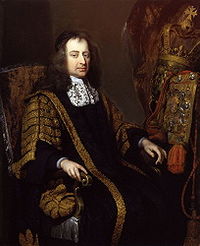
Francis North, 1st Baron Guilford
Encyclopedia

Privy Council of England
The Privy Council of England, also known as His Majesty's Most Honourable Privy Council, was a body of advisers to the sovereign of the Kingdom of England...
KC(1637–1685) was the third son of the 4th Baron North
Dudley North, 4th Baron North
Dudley North, 4th Baron North K.B. was an English politician who sat in the House of Commons variously between 1640 and 1660.-Life:...
, and was created Baron Guilford in 1683, after becoming Lord Keeper of the Great Seal
Lord Keeper of the Great Seal
The Lord Keeper of the Great Seal of England, and later of Great Britain, was formerly an officer of the English Crown charged with physical custody of the Great Seal of England. This evolved into one of the Great Officers of State....
in succession to Lord Nottingham
Heneage Finch, 1st Earl of Nottingham
Heneage Finch, 1st Earl of Nottingham, PC , Lord Chancellor of England, was descended from the old family of Finch, many of whose members had attained high legal eminence, and was the eldest son of Sir Heneage Finch, recorder of London, by his first wife Frances Bell, daughter of Sir Edmond Bell of...
.
He had been an eminent lawyer
Lawyer
A lawyer, according to Black's Law Dictionary, is "a person learned in the law; as an attorney, counsel or solicitor; a person who is practicing law." Law is the system of rules of conduct established by the sovereign government of a society to correct wrongs, maintain the stability of political...
, Solicitor-General
Solicitor General for England and Wales
Her Majesty's Solicitor General for England and Wales, often known as the Solicitor General, is one of the Law Officers of the Crown, and the deputy of the Attorney General, whose duty is to advise the Crown and Cabinet on the law...
(1671), Attorney-General
Attorney General for England and Wales
Her Majesty's Attorney General for England and Wales, usually known simply as the Attorney General, is one of the Law Officers of the Crown. Along with the subordinate Solicitor General for England and Wales, the Attorney General serves as the chief legal adviser of the Crown and its government in...
(1673), and Chief Justice of the Common Pleas
Chief Justice of the Common Pleas
The Court of Common Pleas, also known as the Common Bench or Common Place, was the second highest common law court in the English legal system until 1880, when it was dissolved. As such, the Chief Justice of the Common Pleas was one of the highest judicial officials in England, behind only the Lord...
(1675), and in 1679 was made a member of the Council of Thirty and on its dissolution of the Cabinet
Cabinet of the United Kingdom
The Cabinet of the United Kingdom is the collective decision-making body of Her Majesty's Government in the United Kingdom, composed of the Prime Minister and some 22 Cabinet Ministers, the most senior of the government ministers....
. He was a man of wide culture and a staunch royalist
Cavalier
Cavalier was the name used by Parliamentarians for a Royalist supporter of King Charles I and son Charles II during the English Civil War, the Interregnum, and the Restoration...
. He was hostile to Lord Jeffreys, and regarded the future Chief Justice, Sir Robert Wright, as utterly unfit for any judicial office.
He was generally respected for integrity, but sometimes accused of self-importance and a lack of any sense of humour; for example his excessive agitation at the ridiculous rumour spread by Sunderland and Jeffreys that he had been seen riding on a rhinoceros
Rhinoceros
Rhinoceros , also known as rhino, is a group of five extant species of odd-toed ungulates in the family Rhinocerotidae. Two of these species are native to Africa and three to southern Asia....
.
In 1672 he married Lady Frances Pope, daughter and co-heiress of Thomas Pope, 3rd Earl of Downe, who inherited the Wroxton
Wroxton Abbey
Wroxton Abbey is a Jacobean house in Oxfordshire, with a 1727 garden partly converted to the serpentine style between 1731 and 1751. It is west of Banbury, off the A422, in Wroxton St. Mary. It is now the English campus of Fairleigh Dickinson University....
estate, and he was succeeded as 2nd baron by his son Francis
Francis North, 2nd Baron Guilford
Francis North, 2nd Baron Guilford PC was a British peer and member of the House of Lords.-Life:In 1685, he succeeded his father as Baron Guilford. From 1703 to 1705, Guilford was Lord Lieutenant of Essex. In 1712, he was appointed to the Privy Council, and was First Lord of Trade from 1713 to...
(1673–1729).

